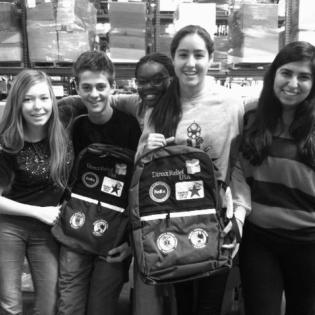Identify the Community Problem
Students are introduced to philanthropy and service-learning. They learn about different needs in the community and community organizations that address these needs. Students are introduced to the full scope of the Project Based Learning (PBL) project. This unit follows the six steps of project based learning. Students establish the "Knows and Need to Knows" for the project. They make a problem statement that drives their service.
The learner will:
- define philanthropy as "the giving of one's time, talent or treasure or taking voluntary action for the common good."
- select issue areas of interest to address through a project.
- brainstorm examples of ways to share their time, talent, and treasure or take action for the common good.
- copies of handouts
Invite someone from the local community foundation or a local philanthropists who can speak to the whole class about the importance of philanthropy, volunteering, and civic engagement.
- philanthropy: the giving of one's time, talent or treasure or taking voluntary action for the common good.
- service-learning: goes beyond volunteerism, community service and youth service by connecting the service experience to the school curriculum and by requiring students to reflect on the meaning they attach to the service they performed.
- common good: working together with other members of the community for the greater benefit of all; promoting the welfare of the community.
- project-based learning (PBL): the use of in-depth and rigorous classroom projects to facilitate learning and assess student competence. Students use technology and inquiry to respond to a complex issue, problem, or challenge. PBL focuses on student-centered inquiry and group learning with the teacher acting as facilitator.
- community needs: conditions that are essential to improving a community.
Gather information from parents/guardians/neighbors about potential service organizations and issue areas and needs to address in the community.
Instructions
Entry Event (An entry event is a chance to engage students and outline expectations for the project.):
Have a guest speaker from a local community foundation speak to the class about the importance of philanthropy, volunteering, and civic engagement. Encourage the speaker to give specific examples of community needs that cannot be met by government and business, and need intervention from the civil society sector.
Driving Question: "How can students create positive change in our community?"
Students brainstorm in small groups how they would like to bring positive change to the community. They share their ideas with the whole group.
With some initial ideas for service-learning projects, they can complete the handout below "Knows and Need to Knows.”
Ask the students what they need as they develop a service-learning project. Aim for true youth-led inquiry, showing them they can be a part of changing the world. The "Need to Know" list tells the teacher what skills or knowledge they need to teach to the learners.
If students struggle with developing ideas, have them reference the handout "A Dozen Types of Community Needs."
The students complete the problem statement handout.
Philanthropy Framework
-
Strand PHIL.I Definitions of Philanthropy
-
Standard DP 01. Define Philanthropy
-
Benchmark MS.1 Define philanthropy as individuals and organizations providing their time, talent, and/or treasures intended for the common good throughout history and around the world. Give examples.
-
-
Standard DP 02. Roles of Government, Business, and Philanthropy
-
Benchmark MS.2 Give examples of needs not met by the government, business, or family sectors.
-
Benchmark MS.6 Identify significant contributions to society that come from the civil society sector.
-
-
-
Strand PHIL.II Philanthropy and Civil Society
-
Standard PCS 01. Self, citizenship, and society
-
Benchmark MS.4 Describe the characteristics of someone who helps others.
-
-
Standard PCS 07. Skills of Civic Engagement
-
Benchmark MS.1 Identify and research public or social issues in the community, nation or the world related to the common good. Form an opinion, and develop and present a persuasive argument using communication tools.
-
-
-
Strand PHIL.III Philanthropy and the Individual
-
Standard PI 01. Reasons for Individual Philanthropy
-
Benchmark MS.1 Define and give examples of the motivations for giving and serving.
-
Benchmark MS.4 Identify and describe the actions of how citizens act for the common good.
-
-
-
Strand PHIL.IV Volunteering and Service
-
Standard VS 01. Needs Assessment
-
Benchmark MS.1 Identify a need in the school, local community, state, nation, or world.
-
Benchmark MS.2 Research the need in the school, neighborhood, local community, state, nation, or world.
-
-
Standard VS 02. Service and Learning
-
Benchmark MS.1 Select a service project based on interests, abilities and research.
-
-
